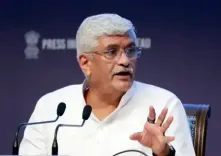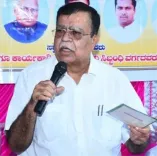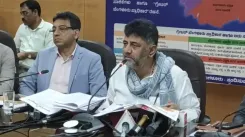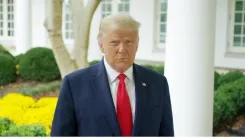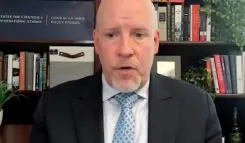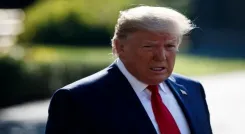Why is the Indian Envoy to the UK Criticizing the Pakistan Army for Honoring Terrorists?
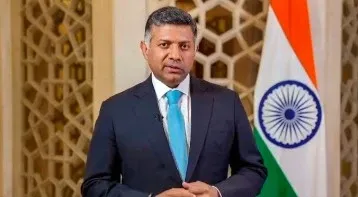
Synopsis
Key Takeaways
- India's envoy to the UK criticizes Pakistan's state funerals for terrorists.
- Pakistan's military actions against India have intensified tensions.
- India emphasizes precision and moderation in its military responses.
- Operation Sindoor targets terrorist infrastructure in response to civilian attacks.
- International pressure on Pakistan to address terrorism is lacking.
New Delhi, May 9 (NationPress) Vikram Doraiswami, the Indian High Commissioner to the UK, has strongly criticized the Pakistan Army for conducting state funerals for designated terrorists, stating that India will reciprocate if Pakistan opts for retaliation.
During an interview with Sky News host Yalda Hakim, Doraiswami showcased a photo of Hafiz Abdul Rauf, a terrorist sanctioned by the US, who was seen being honored by Pakistani Army personnel during a funeral for terrorists killed in India's 'Operation Sindoor' operations.
Doraiswami emphasized that in the past 30 years, the international community should have pressured Pakistan to dismantle its terror infrastructure, a commitment Pakistan has failed to uphold.
He indicated that the situation would resolve if Pakistan ceased its attacks on India's military sites.
The Indian envoy pointed out that the initial rise in tensions was instigated by Pakistan-sponsored terror groups targeting civilians in Pahalgam on April 22.
He characterized India's military actions in Pakistan as "precise, targeted, reasonable, and moderate."
"We made it clear that the aim of this operation was to prevent military escalation," he asserted.
"This fact was indirectly acknowledged by Pakistan through their statements that claimed their airspace was not violated," he added.
"If you give state funerals to terrorists, what does that say about your system? It is well-known that for the last 30 years, Pakistan has utilized this as a method of sub-critical warfare against India," he stated.
"These are actions that the world should have compelled Pakistan to address years ago."
"If the global community genuinely wishes to address this, it must convey to Pakistan that there is an opportunity for a peaceful resolution," he noted.
India's Ambassador to the US, Vinay Kwatra, remarked that Pakistan's military reaction to India's Operation Sindoor was perceived as supporting terrorists, which prompted further counteractions from India.
"India's priority is to dismantle terrorism, hold the guilty accountable, and ensure justice, rather than escalate into a full-scale war," he added.
He clarified that India is not at war with Pakistan, but rather with terrorism.
"On April 22, four Pakistan-backed terrorists ruthlessly killed 26 Indian civilians in front of their families. India considers this a despicable terrorist act,” he stated during an interview with CNN-News18.
“India executed a measured, calibrated military response aimed at terrorist infrastructure in Pakistan and Pakistan-occupied Kashmir, intended to hold terrorists accountable and deliver justice to the victims,” he further explained.
Previously, Foreign Secretary Vikram Misri used the same image of Pakistani officials at the funerals of terrorists, indicating that it contradicts claims that those killed were civilians.
He noted that while state funerals for terrorists may be customary in Pakistan, it does not make sense to India.
Hostilities between India and Pakistan escalated on Thursday after the Pakistani military attempted to target military stations in Jammu, Pathankot, Udhampur, and other sites with missiles and drones, all of which were intercepted by Indian forces.
Sirens sounded and several explosions were reported in Akhnoor, Samba, Baramulla, Kupwara, and various other regions as the Indian military conducted extensive aerial surveillance operations along the border to counter Pakistan's unprovoked aggression.
India retaliated with strikes on Pakistan's capital, Islamabad, as well as Lahore and Sialkot late Thursday after thwarting multiple attacks on Indian cities, including downing a Pakistani F-16 fighter jet in Rajasthan.
Earlier on Thursday, India targeted air defense radars and systems in several locations in Pakistan, including Lahore and Rawalpindi, successfully destroying the air defense system in Lahore, delivering a significant blow to the Pakistan Army.
On Wednesday, India initiated Operation Sindoor, targeting nine terror sites in Pakistan and Pakistan-occupied Kashmir to avenge the killings of 26 individuals in Kashmir's Pahalgam on April 22. The Resistance Front (TRF), a shadow group of Lashkar-e-Toiba (LeT), claimed responsibility for the attacks.

